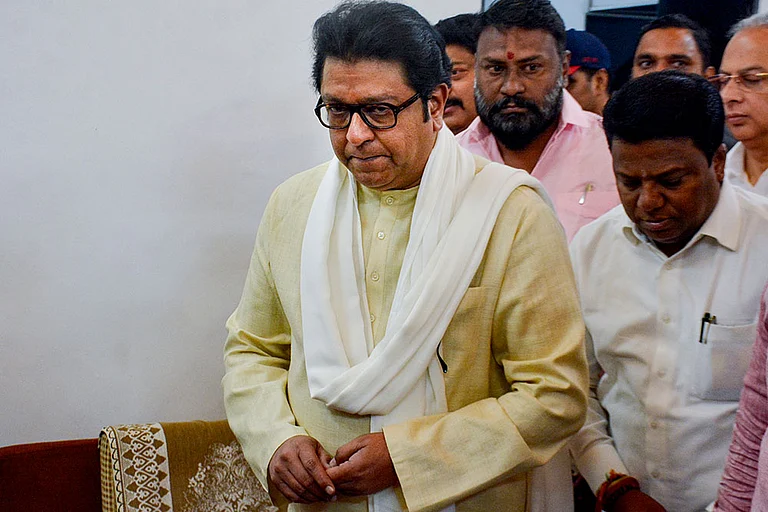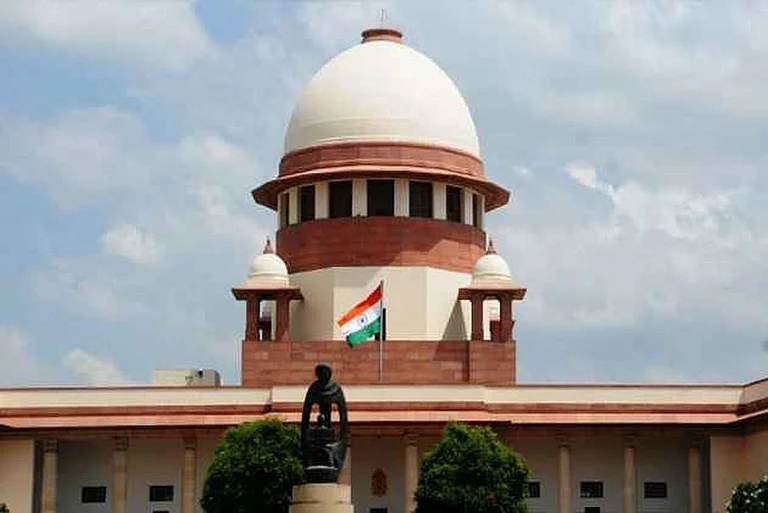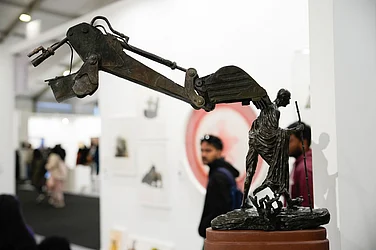It’s almost puzzling how solitary crimes sometimes shake the soul of a city and attain a scale and proportion way beyond their immediate, often petty circumstances. The unhurried city of Lucknow in Uttar Pradesh, the genteel home of tehzeeb, is presently convulsed by shock and horror. No long roll call of casualties here—indeed, one corpse on a city street seems insignificant compared to the hundreds who die of encephalitis just a few hours’ drive away. Still, because of what it comes to symbolise, how it concentrates unto itself a lot of ambient fears and meanings from the surrounding context, it has touched the city’s people at a very elemental level. Instead of their old networks of conviviality generating a sense of comfort and security, the discussions in Lucknow have acquired a tinge of abstract dread. As if their fabled way of life is itself a casualty, as if the city’s character is changing for ever—if not headed for the morgue.
What happened was as bizarre as it was random: nothing in its routine setting should have brought it about. A father of two was shot by a police constable late on the night of September 29, reportedly for not halting his car when signalled to. Vivek Tiwari, a white-collar worker with Apple, died shortly after the bullet tore through his chin. His female colleague, who was with him, testified that the constable shot without provocation. The latter, now under arrest, says Tiwari tried to run him over and he shot in self-defence. For three days, local front-pages obsessed over details of the incident. Headlines and hashtags conveyed the shockwaves across the country.

Police on October 2 reconstructed the sequence of events leading to Vivek Tiwari’s death
At 2 am, four days after the incident, the spot of crime is a deserted spread of road, awash with streetlights. A stone’s throw away, the light at the entrance of a residential complex blinks intermittently. Two shadowy figures, security guards in all likelihood, watch with rapt attention from behind the gates. The road, stained with gutkha and betel spit, bears circles made with white chalk at the exact spot where the incident happened—made after the police re-enacted the whole incident for investigation purposes.
Twelve hours earlier/Tuesday afternoon: A high-voltage sense of anticipation hangs in the air as the police enactment—essentially an adaptation of the witness’s account—is set to begin. The entire area has been cordoned off. Still, local residents have joined the swarm of journalists. It’s a very professional-looking team—a person in a white coat, one with gloves on, one filming seamlessly, one taking photographs. All of it is being overseen by Sujeet Pandey, I-G, Lucknow range, who is heading the investigation.

Vivek Tiwari
Immaculately dressed in white shirt and black trousers, Pandey conducts the exercise with great patience and with an air suggestive of long association with authority. As a constable trains his gun at the car driver, one bystander throws a jibe in chaste Lucknowi accent, “Dekh liye chamber mein hai toh nahin, nahin phir se ek ho jaaye (Make sure there is no bullet inside, lest there’s a repeat of the incident).” The cackles draw helpless glances from the policemen, already at the receiving end of public ire over the past four days.
But underlying the snide remarks is a layer of fear. “Bhaiyya, bhay samaa gaya hai (Fear has set in). We have stopped going out after 10 pm. If even Lucknow is not safe, which other city can you expect to be safe?” asks Abhishek Singh (26), a businessman. As he sees cops on two motorcycles going past, he seethes, “Look at them. They think they’ve done something very macho. If they can fire at us in self-defence, we can also run our vehicle over them in self-defence, right?”

The site of the Aligarh encounter that took place on September 20.
Another resident, who lives nearby, says the two constables involved in the incident only do extortion in the area. “They just roam around looking for couples. Wherever they find any, they’ll go and quickly take their photographs, and then ask the girl to call her father. The couple has no option but to shell all their money to avoid embarrassment,” says Thakur Prasad Pandey, 49, who claims to be unemployed. The person next to him adds that the state government’s free hand to the police has made them ‘nirankush’ (not bound by rules).
Since the Yogi Adityanath government took charge of the state, the police force has come under accusations of high-handedness on several occasions. Besides cases of arbitrary actions—last month, for instance, when a lady constable in Meerut was seen in a video slapping a Hindu woman for allegedly having an affair with a Muslim man—there has been a spate of deaths in police encounters under Adityanath’s rule. In the one-and-a-half years he has been at the helm, there have been, by the government’s own admission, close to 1,500 encounters in which 67 people have been killed. Opposition parties and rights groups claim that most of these were staged and the government is killing Muslims, Dalits and OBCs as part of a nefarious design.

Wife and grandmother of the slain Mustakeem
The most recent case of death in an encounter happened in Aligarh on September 20, where, bizarrely, the police invited media persons to come and film the incident live. Two young men, Mustakeem and Naushad, were killed in the alleged encounter. The police said they were complicit in six murders, three of which happened in Aligarh on September 14 while three happened in Etah earlier. Asked about the evidence incriminating Mustakeem and Naushad, Manilal Patidar, SP, Aligarh Rural, said the duo’s phone numbers came up while the police were doing “B-party and C-party surveillance” on the accused in the first Etah murder.
Rafeekan, Mustakeem’s grandmother, and Hina, his wife, both say the police came to their house on September 16 and picked up four members of their family—Mustakeem, Naushad, Nafees and Salman. Away from the watch of the two cops stationed outside their house, preventing people from meeting the family, other residents too ascertain that the four men were picked up from the house by the police. Mustakeem was Naushad’s brother-in-law and their ages, according to the family, were 22 and 17 respectively.

The brother of one of the alleged victims of Mustakeem and Naushad
The police, however, deny this and say Mustakeem and Naushad were absconding. Patidar tells Outlook that Mustakeem had spent 7-10 years in jail, was actually 34-35 years old, had a fake Aadhaar card, and kept changing names. Aligarh SSP Ajay Kumar Sahni, in a press note issued after the encounter, said Mustakeem and Naushad had been running a gang since 2007, and ‘Bangladeshi links’ were surfacing in the investigations.
Besides, the kin of the three murder victims in Aligarh too seem miffed with the police. Giriraj Singh, brother of slain godman Roopdas, says the police could not find any culprits for his brother’s murder. “They caught random people. They don’t have any evidence. Whenever I go to the police station asking for evidence, they say they’ll call me when they find it,” says Singh, “I want justice for my brother. I don’t care how much money goes down the drain for that.” Similarly, Lalit Kumar, whose brother and sister-in-law were killed, says the police could not find the mobile phone of his brother, or give the family any conclusive proof.
Activists say the targeted killing of people from certain communities in staged encounters is being carried out to crush the morale of political party workers from these communities. “Of the first 50 deaths in encounters under this government, 21 were Muslims, and most of the others were from backward classes,” says Rajeev Yadav, general secretary of Rihai Manch, a politico-legal advocacy group working for the marginalised.

Two more in frames.
The culture of excesses is orchestrated from the top leadership in the state, says Rajeev. In an interview to a television channel last year, Adityanath had said that if people committed crimes in UP, they would be shot dead. “Why is only constable Prashant Chaudhary responsible for Vivek Tiwari’s death? Wasn’t it Adityanath who formed anti-Romeo squads and told them to strike wherever they saw a boy and a girl together? The constable was doing just that. Tiwari was killed by a mindset that has been cultivated by Adityanath,” says Rajeev. After the incident, the CM sought to assuage sentiments, meeting the victim’s family, and announcing aid of Rs 40 lakh and a government job to the wife. That hasn’t altered the core of the narrative, though.
Other reasons too are ascribed to the UP police’s high-handedness. A.L. Banerjee, former state DGP, says a lot of recently inducted rank and file police staff do not receive training in as comprehensive a manner as their seniors did. “Around 2008-09, it was decided that the police force needed an additional 2 lakh personnel. Some 40,000 were recruited in one go and trained under inadequate infrastructure. Later, their training period was also cut from nine to six months, which I think was atrocious. Lack of adequate training leads to indiscipline,” says Banerjee, who headed the force between February-December 2014.
On the streets of Lucknow, the conversations flow—the city folk are proverbially fond of talking. It’s midnight and child labourers at the tea shops are sweeping the area clean. Men clad in banyans sit in darkness, rubbing the utensils clean, wrapping up the day’s business. The discussions have taken a morbid turn since last week. A bunch of men in their mid-twenties, come to have tea at Burlington Chauraha, are overheard talking about a viral video from Delhi where an extortionist “put his gun at the belly of a man and fired”. The discussion inevitably strays back to the original incident. “…aur besharmi dekhiye, justify kar rahe thhe shuru mein (And look at their shamelessness. They were defending the constable initially),” one of them says.

A policewoman assaulted a Hindu girl for allegedly having an affair with a Muslim, in a now-infamous incident
One Rajesh Yadav, a cloth trader in his early thirties, is sitting in a car with his friend, having flavoured milk in a kulhad. “If there had been even one minor case against Tiwari, they would have made it look like an encounter. ‘He was an old criminal, and there was an exchange of fire for half-an-hour,’ they would have said,” intones Yadav, as he scrapes the inner surface of the kulhad with his finger and licks it. It’s a common theme. Just before him, a lawyer who looked in his fifties reprised it. “Had it been a Muslim, they would have thrown an AK-47 inside and claimed they have shot a terrorist,” said Abdul Razzaque Khan, chairman of the Bar Council of Uttar Pradesh’s executive committee, at Jagran Chauraha, where he had come to have paan.
The policemen sit in ones and twos at the big junctions. In Hazratganj, a group is stationed near a police outpost. The incident has done colossal damage to the force’s credibility, and they know it. “No matter how hard a sepoy works, nobody remembers. One small mistake and…” says a young constable, requesting anonymity. A few inspectors also express concerns. “When the Nirbhaya rape happened in Delhi, everybody was asking why the police did not check the vehicle. When we do, we face this. The car was parked there. What if a body was found inside the car next morning?” asks one of them, again requesting anonymity, saying he already has enough worries and doesn’t wish to invite more.
Lucknowis, however, are not in a particularly indulgent mood. Some say the government must not be spared. “This party asked for votes saying they had a kohinoor in their pocket. Gullible as we are, we believed them. The kohinoor turned out to be a plastic one,” says Rakesh Yadav, 45, a road contractor, ruing the delay in payments for government contracts. The city, it appears, will take its time to recover from the shock, and the police and the government have much to do to restore people’s faith.
By Salik Ahmad in Lucknow


























